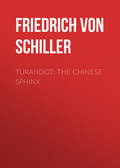
Фридрих Шиллер
The Thirty Years War – Complete
The alternative was a painful one. On the one side, the King of Sweden was before his gates with a formidable army; on the other, he saw the inevitable vengeance of the Emperor, and the fearful example of so many German princes, who were now wandering in misery, the victims of that revenge. The more immediate danger decided his resolution. The gates of Stettin were opened to the king; the Swedish troops entered; and the Austrians, who were advancing by rapid marches, anticipated. The capture of this place procured for the king a firm footing in Pomerania, the command of the Oder, and a magazine for his troops. To prevent a charge of treachery, Bogislaus was careful to excuse this step to the Emperor on the plea of necessity; but aware of Ferdinand’s implacable disposition, he entered into a close alliance with his new protector. By this league with Pomerania, Gustavus secured a powerful friend in Germany, who covered his rear, and maintained his communication with Sweden.
As Ferdinand was already the aggressor in Prussia, Gustavus Adolphus thought himself absolved from the usual formalities, and commenced hostilities without any declaration of war. To the other European powers, he justified his conduct in a manifesto, in which he detailed the grounds which had led him to take up arms. Meanwhile he continued his progress in Pomerania, while he saw his army daily increasing. The troops which had fought under Mansfeld, Duke Christian of Brunswick, the King of Denmark, and Wallenstein, came in crowds, both officers and soldiers, to join his victorious standard.
At the Imperial court, the invasion of the king of Sweden at first excited far less attention than it merited. The pride of Austria, extravagantly elated by its unheard-of successes, looked down with contempt upon a prince, who, with a handful of men, came from an obscure corner of Europe, and who owed his past successes, as they imagined, entirely to the incapacity of a weak opponent. The depreciatory representation which Wallenstein had artfully given of the Swedish power, increased the Emperor’s security; for what had he to fear from an enemy, whom his general undertook to drive with such ease from Germany? Even the rapid progress of Gustavus Adolphus in Pomerania, could not entirely dispel this prejudice, which the mockeries of the courtiers continued to feed. He was called in Vienna the Snow King, whom the cold of the north kept together, but who would infallibly melt as he advanced southward. Even the electors, assembled in Ratisbon, disregarded his representations; and, influenced by an abject complaisance to Ferdinand, refused him even the title of king. But while they mocked him in Ratisbon and Vienna, in Mecklenburg and Pomerania, one strong town after another fell into his hands.
Notwithstanding this contempt, the Emperor thought it proper to offer to adjust his differences with Sweden by negociation, and for that purpose sent plenipotentiaries to Denmark. But their instructions showed how little he was in earnest in these proposals, for he still continued to refuse to Gustavus the title of king. He hoped by this means to throw on the king of Sweden the odium of being the aggressor, and thereby to ensure the support of the States of the empire. The conference at Dantzic proved, as might be expected, fruitless, and the animosity of both parties was increased to its utmost by an intemperate correspondence.
An imperial general, Torquato Conti, who commanded in Pomerania, had, in the mean time, made a vain attempt to wrest Stettin from the Swedes. The Imperialists were driven out from one place after another; Damm, Stargard, Camin, and Wolgast, soon fell into the hands of Gustavus. To revenge himself upon the Duke of Pomerania, the imperial general permitted his troops, upon his retreat, to exercise every barbarity on the unfortunate inhabitants of Pomerania, who had already suffered but too severely from his avarice. On pretence of cutting off the resources of the Swedes, the whole country was laid waste and plundered; and often when the Imperialists were unable any longer to maintain a place, it was laid in ashes, in order to leave the enemy nothing but ruins. But these barbarities only served to place in a more favourable light the opposite conduct of the Swedes, and to win all hearts to their humane monarch. The Swedish soldier paid for all he required; no private property was injured on his march. The Swedes consequently were received with open arms both in town and country, whilst every Imperialist that fell into the hands of the Pomeranian peasantry was ruthlessly murdered. Many Pomeranians entered into the service of Sweden, and the estates of this exhausted country willingly voted the king a contribution of 100,000 florins.
Torquato Conti, who, with all his severity of character, was a consummate general, endeavoured to render Stettin useless to the king of Sweden, as he could not deprive him of it. He entrenched himself upon the Oder, at Gartz, above Stettin, in order, by commanding that river, to cut off the water communication of the town with the rest of Germany. Nothing could induce him to attack the King of Sweden, who was his superior in numbers, while the latter was equally cautious not to storm the strong entrenchments of the Imperialists. Torquato, too deficient in troops and money to act upon the offensive against the king, hoped by this plan of operations to give time for Tilly to hasten to the defence of Pomerania, and then, in conjunction with that general, to attack the Swedes. Seizing the opportunity of the temporary absence of Gustavus, he made a sudden attempt upon Stettin, but the Swedes were not unprepared for him. A vigorous attack of the Imperialists was firmly repulsed, and Torquato was forced to retire with great loss. For this auspicious commencement of the war, however, Gustavus was, it must be owned, as much indebted to his good fortune as to his military talents. The imperial troops in Pomerania had been greatly reduced since Wallenstein’s dismissal; moreover, the outrages they had committed were now severely revenged upon them; wasted and exhausted, the country no longer afforded them a subsistence. All discipline was at an end; the orders of the officers were disregarded, while their numbers daily decreased by desertion, and by a general mortality, which the piercing cold of a strange climate had produced among them.
Under these circumstances, the imperial general was anxious to allow his troops the repose of winter quarters, but he had to do with an enemy to whom the climate of Germany had no winter. Gustavus had taken the precaution of providing his soldiers with dresses of sheep-skin, to enable them to keep the field even in the most inclement season. The imperial plenipotentiaries, who came to treat with him for a cessation of hostilities, received this discouraging answer: “The Swedes are soldiers in winter as well as in summer, and not disposed to oppress the unfortunate peasantry. The Imperialists may act as they think proper, but they need not expect to remain undisturbed.” Torquato Conti soon after resigned a command, in which neither riches nor reputation were to be gained.
In this inequality of the two armies, the advantage was necessarily on the side of the Swedes. The Imperialists were incessantly harassed in their winter quarters; Greifenhagan, an important place upon the Oder, taken by storm, and the towns of Gartz and Piritz were at last abandoned by the enemy. In the whole of Pomerania, Greifswald, Demmin, and Colberg alone remained in their hands, and these the king made great preparations to besiege. The enemy directed their retreat towards Brandenburg, in which much of their artillery and baggage, and many prisoners fell into the hands of the pursuers.
By seizing the passes of Riebnitz and Damgarden, Gustavus had opened a passage into Mecklenburg, whose inhabitants were invited to return to their allegiance under their legitimate sovereigns, and to expel the adherents of Wallenstein. The Imperialists, however, gained the important town of Rostock by stratagem, and thus prevented the farther advance of the king, who was unwilling to divide his forces. The exiled dukes of Mecklenburg had ineffectually employed the princes assembled at Ratisbon to intercede with the Emperor: in vain they had endeavoured to soften Ferdinand, by renouncing the alliance of the king, and every idea of resistance. But, driven to despair by the Emperor’s inflexibility, they openly espoused the side of Sweden, and raising troops, gave the command of them to Francis Charles Duke of Saxe-Lauenburg. That general made himself master of several strong places on the Elbe, but lost them afterwards to the Imperial General Pappenheim, who was despatched to oppose him. Soon afterwards, besieged by the latter in the town of Ratzeburg, he was compelled to surrender with all his troops. Thus ended the attempt which these unfortunate princes made to recover their territories; and it was reserved for the victorious arm of Gustavus Adolphus to render them that brilliant service.
The Imperialists had thrown themselves into Brandenburg, which now became the theatre of the most barbarous atrocities. These outrages were inflicted upon the subjects of a prince who had never injured the Emperor, and whom, moreover, he was at the very time inciting to take up arms against the King of Sweden. The sight of the disorders of their soldiers, which want of money compelled them to wink at, and of authority over their troops, excited the disgust even of the imperial generals; and, from very shame, their commander-in-chief, Count Schaumburg, wished to resign.
Without a sufficient force to protect his territories, and left by the Emperor, in spite of the most pressing remonstrances, without assistance, the Elector of Brandenburg at last issued an edict, ordering his subjects to repel force by force, and to put to death without mercy every Imperial soldier who should henceforth be detected in plundering. To such a height had the violence of outrage and the misery of the government risen, that nothing was left to the sovereign, but the desperate extremity of sanctioning private vengeance by a formal law.
The Swedes had pursued the Imperialists into Brandenburg; and only the Elector’s refusal to open to him the fortress of Custrin for his march, obliged the king to lay aside his design of besieging Frankfort on the Oder. He therefore returned to complete the conquest of Pomerania, by the capture of Demmin and Colberg. In the mean time, Field-Marshal Tilly was advancing to the defence of Brandenburg.
This general, who could boast as yet of never having suffered a defeat, the conqueror of Mansfeld, of Duke Christian of Brunswick, of the Margrave of Baden, and the King of Denmark, was now in the Swedish monarch to meet an opponent worthy of his fame. Descended of a noble family in Liege, Tilly had formed his military talents in the wars of the Netherlands, which was then the great school for generals. He soon found an opportunity of distinguishing himself under Rodolph II. in Hungary, where he rapidly rose from one step to another. After the peace, he entered into the service of Maximilian of Bavaria, who made him commander-in-chief with absolute powers. Here, by his excellent regulations, he was the founder of the Bavarian army; and to him, chiefly, Maximilian was indebted for his superiority in the field. Upon the termination of the Bohemian war, he was appointed commander of the troops of the League; and, after Wallenstein’s dismissal, generalissimo of the imperial armies. Equally stern towards his soldiers and implacable towards his enemies, and as gloomy and impenetrable as Wallenstein, he was greatly his superior in probity and disinterestedness. A bigoted zeal for religion, and a bloody spirit of persecution, co-operated, with the natural ferocity of his character, to make him the terror of the Protestants. A strange and terrific aspect bespoke his character: of low stature, thin, with hollow cheeks, a long nose, a broad and wrinkled forehead, large whiskers, and a pointed chin; he was generally attired in a Spanish doublet of green satin, with slashed sleeves, with a small high peaked hat upon his head, surmounted by a red feather which hung down to his back. His whole aspect recalled to recollection the Duke of Alva, the scourge of the Flemings, and his actions were far from effacing the impression. Such was the general who was now to be opposed to the hero of the north.
Tilly was far from undervaluing his antagonist, “The King of Sweden,” said he in the Diet at Ratisbon, “is an enemy both prudent and brave, inured to war, and in the flower of his age. His plans are excellent, his resources considerable; his subjects enthusiastically attached to him. His army, composed of Swedes, Germans, Livonians, Finlanders, Scots and English, by its devoted obedience to their leader, is blended into one nation: he is a gamester in playing with whom not to have lost is to have won a great deal.”
The progress of the King of Sweden in Brandenburg and Pomerania, left the new generalissimo no time to lose; and his presence was now urgently called for by those who commanded in that quarter. With all expedition, he collected the imperial troops which were dispersed over the empire; but it required time to obtain from the exhausted and impoverished provinces the necessary supplies. At last, about the middle of winter, he appeared at the head of 20,000 men, before Frankfort on the Oder, where he was joined by Schaumburg. Leaving to this general the defence of Frankfort, with a sufficient garrison, he hastened to Pomerania, with a view of saving Demmin, and relieving Colberg, which was already hard pressed by the Swedes. But even before he had left Brandenburg, Demmin, which was but poorly defended by the Duke of Savelli, had surrendered to the king, and Colberg, after a five months’ siege, was starved into a capitulation. As the passes in Upper Pomerania were well guarded, and the king’s camp near Schwedt defied attack, Tilly abandoned his offensive plan of operations, and retreated towards the Elbe to besiege Magdeburg.
The capture of Demmin opened to the king a free passage into Mecklenburg; but a more important enterprise drew his arms into another quarter. Scarcely had Tilly commenced his retrograde movement, when suddenly breaking up his camp at Schwedt, the king marched his whole force against Frankfort on the Oder. This town, badly fortified, was defended by a garrison of 8,000 men, mostly composed of those ferocious bands who had so cruelly ravaged Pomerania and Brandenburg. It was now attacked with such impetuosity, that on the third day it was taken by storm. The Swedes, assured of victory, rejected every offer of capitulation, as they were resolved to exercise the dreadful right of retaliation. For Tilly, soon after his arrival, had surrounded a Swedish detachment, and, irritated by their obstinate resistance, had cut them in pieces to a man. This cruelty was not forgotten by the Swedes. “New Brandenburg Quarter”, they replied to the Imperialists who begged their lives, and slaughtered them without mercy. Several thousands were either killed or taken, and many were drowned in the Oder, the rest fled to Silesia. All their artillery fell into the hands of the Swedes. To satisfy the rage of his troops, Gustavus Adolphus was under the necessity of giving up the town for three hours to plunder.
While the king was thus advancing from one conquest to another, and, by his success, encouraging the Protestants to active resistance, the Emperor proceeded to enforce the Edict of Restitution, and, by his exorbitant pretensions, to exhaust the patience of the states. Compelled by necessity, he continued the violent course which he had begun with such arrogant confidence; the difficulties into which his arbitrary conduct had plunged him, he could only extricate himself from by measures still more arbitrary. But in so complicated a body as the German empire, despotism must always create the most dangerous convulsions. With astonishment, the princes beheld the constitution of the empire overthrown, and the state of nature to which matters were again verging, suggested to them the idea of self-defence, the only means of protection in such a state of things. The steps openly taken by the Emperor against the Lutheran church, had at last removed the veil from the eyes of John George, who had been so long the dupe of his artful policy. Ferdinand, too, had personally offended him by the exclusion of his son from the archbishopric of Magdeburg; and field-marshal Arnheim, his new favourite and minister, spared no pains to increase the resentment of his master. Arnheim had formerly been an imperial general under Wallenstein, and being still zealously attached to him, he was eager to avenge his old benefactor and himself on the Emperor, by detaching Saxony from the Austrian interests. Gustavus Adolphus, supported by the Protestant states, would be invincible; a consideration which already filled the Emperor with alarm. The example of Saxony would probably influence others, and the Emperor’s fate seemed now in a manner to depend upon the Elector’s decision. The artful favourite impressed upon his master this idea of his own importance, and advised him to terrify the Emperor, by threatening an alliance with Sweden, and thus to extort from his fears, what he had sought in vain from his gratitude. The favourite, however, was far from wishing him actually to enter into the Swedish alliance, but, by holding aloof from both parties, to maintain his own importance and independence. Accordingly, he laid before him a plan, which only wanted a more able hand to carry it into execution, and recommended him, by heading the Protestant party, to erect a third power in Germany, and thereby maintain the balance between Sweden and Austria.
This project was peculiarly flattering to the Saxon Elector, to whom the idea of being dependent upon Sweden, or of longer submitting to the tyranny of the Emperor, was equally hateful. He could not, with indifference, see the control of German affairs wrested from him by a foreign prince; and incapable as he was of taking a principal part, his vanity would not condescend to act a subordinate one. He resolved, therefore, to draw every possible advantage from the progress of Gustavus, but to pursue, independently, his own separate plans. With this view, he consulted with the Elector of Brandenburg, who, from similar causes, was ready to act against the Emperor, but, at the same time, was jealous of Sweden. In a Diet at Torgau, having assured himself of the support of his Estates, he invited the Protestant States of the empire to a general convention, which took place at Leipzig, on the 6th February 1631. Brandenburg, Hesse Cassel, with several princes, counts, estates of the empire, and Protestant bishops were present, either personally or by deputy, at this assembly, which the chaplain to the Saxon Court, Dr. Hoe von Hohenegg, opened with a vehement discourse from the pulpit. The Emperor had, in vain, endeavoured to prevent this self-appointed convention, whose object was evidently to provide for its own defence, and which the presence of the Swedes in the empire, rendered more than usually alarming. Emboldened by the progress of Gustavus Adolphus, the assembled princes asserted their rights, and after a session of two months broke up, with adopting a resolution which placed the Emperor in no slight embarrassment. Its import was to demand of the Emperor, in a general address, the revocation of the Edict of Restitution, the withdrawal of his troops from their capitals and fortresses, the suspension of all existing proceedings, and the abolition of abuses; and, in the mean time, to raise an army of 40,000 men, to enable them to redress their own grievances, if the Emperor should still refuse satisfaction.
A further incident contributed not a little to increase the firmness of the Protestant princes. The King of Sweden had, at last, overcome the scruples which had deterred him from a closer alliance with France, and, on the 13th January 1631, concluded a formal treaty with this crown. After a serious dispute respecting the treatment of the Roman Catholic princes of the empire, whom France took under her protection, and against whom Gustavus claimed the right of retaliation, and after some less important differences with regard to the title of majesty, which the pride of France was loth to concede to the King of Sweden, Richelieu yielded the second, and Gustavus Adolphus the first point, and the treaty was signed at Beerwald in Neumark. The contracting parties mutually covenanted to defend each other with a military force, to protect their common friends, to restore to their dominions the deposed princes of the empire, and to replace every thing, both on the frontier and in the interior of Germany, on the same footing on which it stood before the commencement of the war. For this end, Sweden engaged to maintain an army of 30,000 men in Germany, and France agreed to furnish the Swedes with an annual subsidy of 400,000 dollars. If the arms of Gustavus were successful, he was to respect the Roman Catholic religion and the constitution of the empire in all the conquered places, and to make no attempt against either. All Estates and princes whether Protestant or Roman Catholic, either in Germany or in other countries, were to be invited to become parties to the treaty; neither France nor Sweden was to conclude a separate peace without the knowledge and consent of the other; and the treaty itself was to continue in force for five years.
Great as was the struggle to the King of Sweden to receive subsidies from France, and sacrifice his independence in the conduct of the war, this alliance with France decided his cause in Germany. Protected, as he now was, by the greatest power in Europe, the German states began to feel confidence in his undertaking, for the issue of which they had hitherto good reason to tremble. He became truly formidable to the Emperor. The Roman Catholic princes too, who, though they were anxious to humble Austria, had witnessed his progress with distrust, were less alarmed now that an alliance with a Roman Catholic power ensured his respect for their religion. And thus, while Gustavus Adolphus protected the Protestant religion and the liberties of Germany against the aggression of Ferdinand, France secured those liberties, and the Roman Catholic religion, against Gustavus himself, if the intoxication of success should hurry him beyond the bounds of moderation.
The King of Sweden lost no time in apprizing the members of the confederacy of Leipzig of the treaty concluded with France, and inviting them to a closer union with himself. The application was seconded by France, who spared no pains to win over the Elector of Saxony. Gustavus was willing to be content with secret support, if the princes should deem it too bold a step as yet to declare openly in his favour. Several princes gave him hopes of his proposals being accepted on the first favourable opportunity; but the Saxon Elector, full of jealousy and distrust towards the King of Sweden, and true to the selfish policy he had pursued, could not be prevailed upon to give a decisive answer.
The resolution of the confederacy of Leipzig, and the alliance betwixt France and Sweden, were news equally disagreeable to the Emperor. Against them he employed the thunder of imperial ordinances, and the want of an army saved France from the full weight of his displeasure. Remonstrances were addressed to all the members of the confederacy, strongly prohibiting them from enlisting troops. They retorted with explanations equally vehement, justified their conduct upon the principles of natural right, and continued their preparations.
Meantime, the imperial generals, deficient both in troops and money, found themselves reduced to the disagreeable alternative of losing sight either of the King of Sweden, or of the Estates of the empire, since with a divided force they were not a match for either. The movements of the Protestants called their attention to the interior of the empire, while the progress of the king in Brandenburg, by threatening the hereditary possessions of Austria, required them to turn their arms to that quarter. After the conquest of Frankfort, the king had advanced upon Landsberg on the Warta, and Tilly, after a fruitless attempt to relieve it, had again returned to Magdeburg, to prosecute with vigour the siege of that town.
The rich archbishopric, of which Magdeburg was the capital, had long been in the possession of princes of the house of Brandenburg, who introduced the Protestant religion into the province. Christian William, the last administrator, had, by his alliance with Denmark, incurred the ban of the empire, on which account the chapter, to avoid the Emperor’s displeasure, had formally deposed him. In his place they had elected Prince John Augustus, the second son of the Elector of Saxony, whom the Emperor rejected, in order to confer the archbishopric on his son Leopold. The Elector of Saxony complained ineffectually to the imperial court; but Christian William of Brandenburg took more active measures. Relying on the attachment of the magistracy and inhabitants of Brandenburg, and excited by chimerical hopes, he thought himself able to surmount all the obstacles which the vote of the chapter, the competition of two powerful rivals, and the Edict of Restitution opposed to his restoration. He went to Sweden, and, by the promise of a diversion in Germany, sought to obtain assistance from Gustavus. He was dismissed by that monarch not without hopes of effectual protection, but with the advice to act with caution.
Scarcely had Christian William been informed of the landing of his protector in Pomerania, than he entered Magdeburg in disguise. Appearing suddenly in the town council, he reminded the magistrates of the ravages which both town and country had suffered from the imperial troops, of the pernicious designs of Ferdinand, and the danger of the Protestant church. He then informed them that the moment of deliverance was at hand, and that Gustavus Adolphus offered them his alliance and assistance. Magdeburg, one of the most flourishing towns in Germany, enjoyed under the government of its magistrates a republican freedom, which inspired its citizens with a brave heroism. Of this they had already given proofs, in the bold defence of their rights against Wallenstein, who, tempted by their wealth, made on them the most extravagant demands. Their territory had been given up to the fury of his troops, though Magdeburg itself had escaped his vengeance. It was not difficult, therefore, for the Administrator to gain the concurrence of men in whose minds the rememberance of these outrages was still recent. An alliance was formed between the city and the Swedish king, by which Magdeburg granted to the king a free passage through its gates and territories, with liberty of enlisting soldiers within its boundaries, and on the other hand, obtained promises of effectual protection for its religion and its privileges.
The Administrator immediately collected troops and commenced hostilities, before Gustavus Adolphus was near enough to co-operate with him. He defeated some imperial detachments in the neighbourhood, made a few conquests, and even surprised Halle. But the approach of an imperial army obliged him to retreat hastily, and not without loss, to Magdeburg. Gustavus Adolphus, though displeased with his premature measures, sent Dietrich Falkenberg, an experienced officer, to direct the Administrator’s military operations, and to assist him with his counsel. Falkenberg was named by the magistrates governor of the town during the war. The Prince’s army was daily augmented by recruits from the neighbouring towns; and he was able for some months to maintain a petty warfare with success.
At length Count Pappenheim, having brought his expedition against the Duke of Saxe-Lauenburg to a close, approached the town. Driving the troops of the Administrator from their entrenchments, he cut off his communication with Saxony, and closely invested the place. He was soon followed by Tilly, who haughtily summoned the Elector forthwith to comply with the Edict of Restitution, to submit to the Emperor’s orders, and surrender Magdeburg. The Prince’s answer was spirited and resolute, and obliged Tilly at once to have recourse to arms.
In the meanwhile, the siege was prolonged, by the progress of the King of Sweden, which called the Austrian general from before the place; and the jealousy of the officers, who conducted the operations in his absence, delayed, for some months, the fall of Magdeburg. On the 30th March 1631, Tilly returned, to push the siege with vigour.
The outworks were soon carried, and Falkenberg, after withdrawing the garrisons from the points which he could no longer hold, destroyed the bridge over the Elbe. As his troops were barely sufficient to defend the extensive fortifications, the suburbs of Sudenburg and Neustadt were abandoned to the enemy, who immediately laid them in ashes. Pappenheim, now separated from Tilly, crossed the Elbe at Schonenbeck, and attacked the town from the opposite side.
The garrison, reduced by the defence of the outworks, scarcely exceeded 2000 infantry and a few hundred horse; a small number for so extensive and irregular a fortress. To supply this deficiency, the citizens were armed – a desperate expedient, which produced more evils than those it prevented. The citizens, at best but indifferent soldiers, by their disunion threw the town into confusion. The poor complained that they were exposed to every hardship and danger, while the rich, by hiring substitutes, remained at home in safety. These rumours broke out at last in an open mutiny; indifference succeeded to zeal; weariness and negligence took the place of vigilance and foresight. Dissension, combined with growing scarcity, gradually produced a feeling of despondence, many began to tremble at the desperate nature of their undertaking, and the magnitude of the power to which they were opposed. But religious zeal, an ardent love of liberty, an invincible hatred to the Austrian yoke, and the expectation of speedy relief, banished as yet the idea of a surrender; and divided as they were in every thing else, they were united in the resolve to defend themselves to the last extremity.







